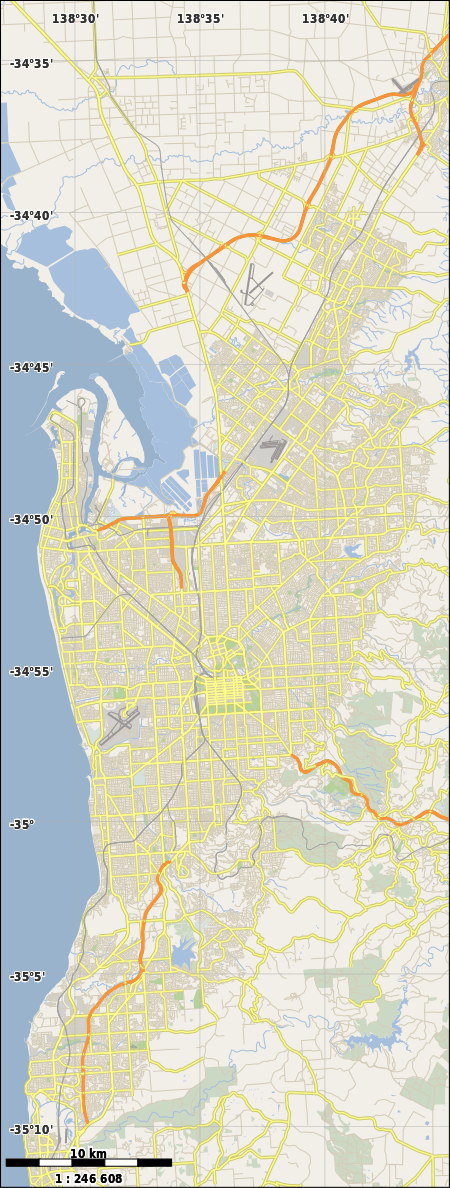National Railway Museum, Port Adelaide
|
The Ron Fitch Pavilion at the museum, 2014. | |
 National Railway Museum Location within Greater Adelaide | |
| Established |
|
|---|---|
| Location |
|
| Coordinates | 34°50′44″S 138°30′31″E / 34.84556°S 138.50861°ECoordinates: 34°50′44″S 138°30′31″E / 34.84556°S 138.50861°E |
| Type | Railway museum |
| Owner | National Railway Museum Inc. |
| Nearest car park | On site |
| Website | National Railway Museum |
The National Railway Museum, Port Adelaide, South Australia, is Australia's largest railway museum with over 100 exhibits on display, primarily from the Commonwealth and South Australian Railways.
History
In 1963 a group of rail preservationists convinced the South Australian Railways Commissioner to allocate land on the site of the former Mile End Roundhouse to house a small collection of withdrawn steam locomotives. The first locomotive arrived on 24 August 1964, with the Mile End Railway Museum officially opened on 5 December 1970. The original site had only a small number of exhibits under cover with most items housed on the site in the open air. The effects of weather took their toll on the exhibits, so an alternative undercover venue was sought.[1]
In 1987 the museum obtained a $2m Australia's Bicentennial Commemorative Grant to redevelop the former Port Dock goods terminal as a new under cover museum. On 2 January 1988 the Mile End Railway Museum closed and on 10 December 1988, the Port Dock Station Railway Museum was officially opened by the Premier of South Australia, John Bannon.[1]
In 1999, funding was received as part of Australia's Centenary of Federation to construct the Commonwealth Railway Museum within the museum's precinct. This new facility, which was opened on 21 October 2001, houses a representative sample of exhibits from the Commonwealth Railways and Australian National. Included are vehicles from The Ghan, Tea & Sugar and Trans-Australian. At the same time, the Port Dock Station Railway Museum was renamed the National Railway Museum.[1]
In May 2009 the main pavilion was named after Ron Fitch, who as South Australian Railways Commissioner had facilitated the transfer much of the museum's early rolling stock. At the same time, the Commonwealth Railways Museum was renamed the Ronald E Fluck Pavilion, after the museum's founder.[1]
Collection
The museum houses its large static collection in two pavilions and the historical goods shed at the site of the original Port Dock railway station. On the site, all three gauges of Australia are represented, these being Narrow (3 ft 6 in or 1,070 mm) Standard (4 feet 8 1⁄2 inches or 1,435 millimetres) and Broad Gauge (5 ft 3 in or 1,600 mm). The collection comprises over 100 exhibits primarily from the Commonwealth and South Australian Railways. It also has rolling stock from the Silverton Tramway and Victorian Railways.[2]
Operational locomotives and railcars on these gauges respectively are steam locomotive Peronne (1918 Andrew Barclay 0-6-0 Tank Locomotive), diesel locomotives 515 and 801, and Redhen railcars 400, 321 and trailer 863. The museum also operates a number of 18 in (457 mm) equipment, mainly steam locomotives Bub (0-4-2T) and Bill (2-4-0 with 4 wheel tender).
Buildings
The museum has a number of historic buildings, some original to the site and other transported for display. Amongst the more historic of these are:[3]
Goods Shed
The original Port Dock Station Goods Shed is included as part of the museum complex. This building is constructed of large timber beams and is typical of the type of buildings constructed by the South Australian Railway in the 19th Century.
Woodville Signal Cabin
The former Woodville signal cabin of the South Australian Railways has been moved to the museum site and connected to the narrow gauge yard.
Callington Station
The "Callington Shelter Shed and Booking Office" is typical of the type of building used by the South Australian Railways at small country stations. It was originally built in 1951 for the then small rural community of Callington, located approximately 20 kilometres west of Murray Bridge on the main Adelaide-Melbourne line. In 1991 an approach was made to Australian National, who agreed to sell the building. This resulted in the building being purchased by a museum member, who subsequently arranged for its donation and transportation to Port Adelaide. It was placed in storage until 1994, when it was re-erected in its current location.
Eudunda Gang Shed
Located at rear of the rollingstock pavilion is the former Eudunda Gang Shed. It was purchased and relocated by members of the museum in 1990.
Operations

The museum operates a number of historic locomotives for shunting purposes and special events where large passenger numbers are applicable, in lieu of this, the 18" gauge steam locomotives and a diesel operate rides of 1.2 km around the museum.
In 1992, the museum, in co-operation with the local council, built a 2 km line along the beach from Semaphore to Fort Glanville. This is operated from October to April, weekends, public holidays and school holidays when temperatures are below 35 degrees Celsius.
The line travels along the coastline, through the sand dunes and the Fort Glanville Conservation Park, with the engine being turned and run around at each end.
Publications
The National Railway Museum publishes Catch Point magazine on alternate months.[4]
See also
References
| Wikimedia Commons has media related to National Railway Museum (Port Adelaide). |
Notes
- 1 2 3 4 Who we are - a brief history of the museum National Railway Museum
- ↑ Rollingstock National Railway Museum
- ↑ Buildings National Railway Museum
- ↑ Catch Point magazine National Railway Museum
Bibliography
- Sampson, Bob (2010). Your Guide to the National Railway Museum (6th (revised) ed.). Port Adelaide, SA: National Railway Museum.
